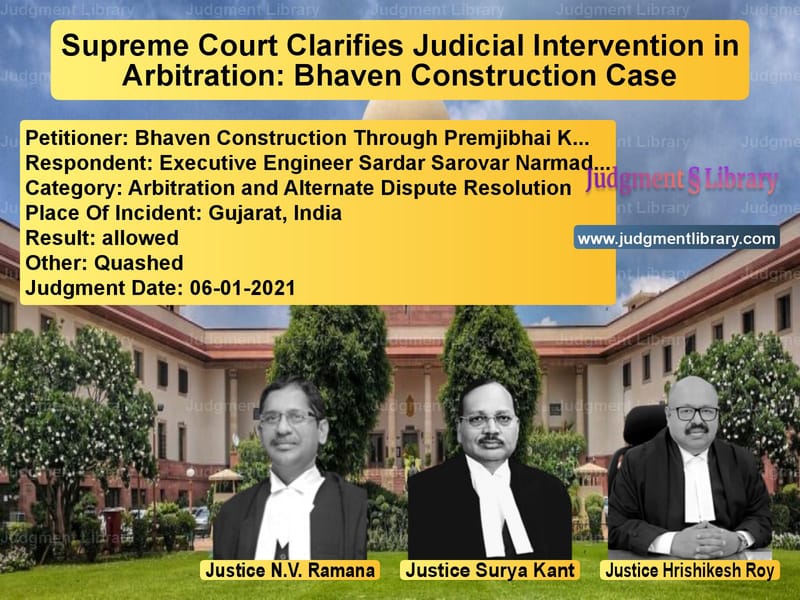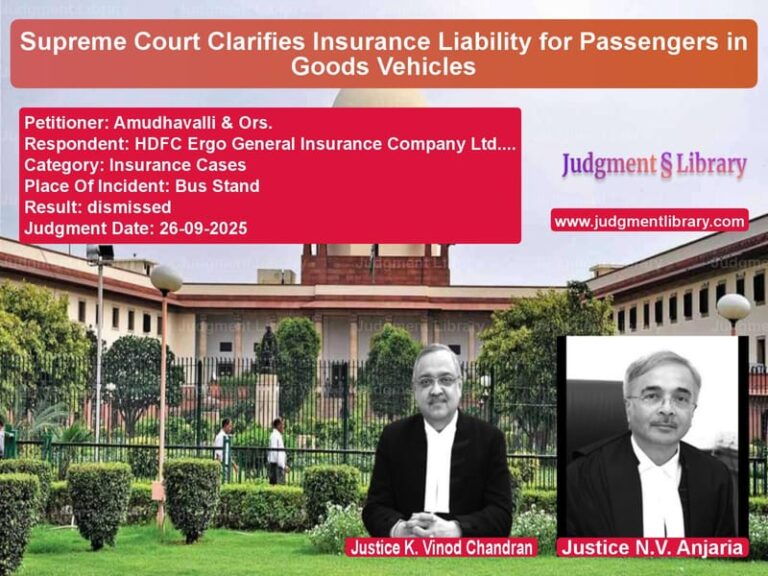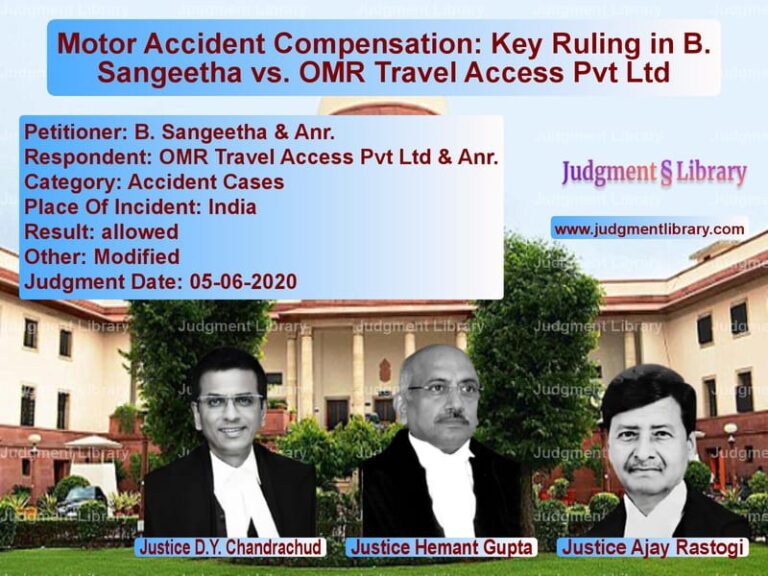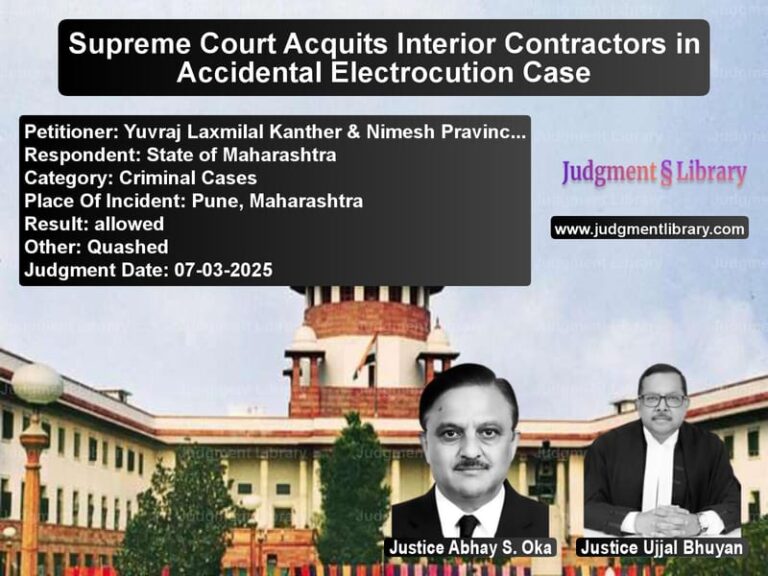Supreme Court Clarifies Judicial Intervention in Arbitration: Bhaven Construction Case
The Supreme Court of India, in the case of Bhaven Construction Through Premjibhai K. Shah vs. Executive Engineer Sardar Sarovar Narmada Nigam Ltd., delivered a crucial judgment addressing the extent of judicial intervention in arbitration proceedings. The ruling emphasized the autonomy of arbitration and reaffirmed the limited scope of interference by courts under Articles 226 and 227 of the Constitution.
Background of the Case
The dispute arose from a contract executed on February 13, 1991, between Bhaven Construction and the Executive Engineer, Sardar Sarovar Narmada Nigam Ltd. The contract, which involved the manufacturing and supply of bricks, contained an arbitration clause (Clause 38) to resolve disputes.
The appellant, Bhaven Construction, issued a notice on November 13, 1998, seeking the appointment of an arbitrator due to disputes regarding payment. However, the respondent rejected the request, citing two reasons:
- The arbitration was governed by the Indian Arbitration Act, 1940, and the subsequent Gujarat Public Works Contracts Disputes Arbitration Tribunal Act, 1992 (the Gujarat Act), which provided for a separate dispute resolution mechanism.
- The arbitration claim was time-barred as Clause 38 mandated that no claims could be brought if an arbitrator was not appointed within 30 days after the defect liability period.
Despite this, the appellant proceeded with arbitration and appointed a sole arbitrator, who rejected the jurisdictional challenge raised by the respondent. The respondent then moved the Gujarat High Court under Articles 226 and 227, challenging the arbitrator’s jurisdiction.
Key Legal Issues Addressed
1. Whether the High Court Could Intervene in Arbitration Proceedings
The primary issue was whether the Gujarat High Court’s interference was justified when the Arbitration and Conciliation Act, 1996 (the Arbitration Act), had an inbuilt mechanism under Section 16 to address jurisdictional objections.
2. Whether the Gujarat Act Superseded the Arbitration Act
The respondent argued that the Gujarat Act provided a separate mechanism for resolving disputes related to public works contracts and that the arbitration agreement in the contract should be overridden.
3. Whether the Petitioner Was Left Without a Remedy
The petitioner contended that any challenge to the arbitration process should have been raised through a Section 34 application under the Arbitration Act after the final award, rather than invoking writ jurisdiction.
Arguments by the Petitioner (Bhaven Construction)
- The High Court should not have interfered in the arbitration process when an alternative remedy under Section 34 of the Arbitration Act was available.
- Section 16(2) of the Arbitration Act allows arbitrators to rule on their own jurisdiction, making judicial intervention at the preliminary stage unnecessary.
- The respondent willingly participated in arbitration and only challenged jurisdiction after an unfavorable ruling.
- The Arbitration Act is a complete code that provides mechanisms for challenging jurisdiction and awards, limiting court intervention.
Arguments by the Respondent (Sardar Sarovar Narmada Nigam Ltd.)
- The Gujarat Act specifically applied to public works contracts, making the Arbitration Act inapplicable.
- Since the arbitration was time-barred as per Clause 38, the arbitrator’s appointment itself was invalid.
- The High Court had the power to intervene under Articles 226 and 227 when an arbitration proceeding was conducted without jurisdiction.
Supreme Court’s Analysis and Findings
1. Arbitration Act as a Self-Contained Code
The Supreme Court reiterated that the Arbitration Act is a comprehensive legal framework designed to minimize judicial interference. The judgment stated:
“The Arbitration Act provides a complete mechanism for challenging jurisdiction under Section 16 and awards under Section 34. Court intervention beyond this framework must be exercised sparingly.”
2. Restricting Judicial Interference Under Articles 226 and 227
The Court clarified that High Courts should not intervene in arbitration unless exceptional circumstances exist. It emphasized:
“The jurisdiction under Articles 226 and 227 must not be used to bypass the statutory framework of the Arbitration Act.”
It further cited Deep Industries Ltd. vs. ONGC (2019), which held that interference in arbitration must be limited to cases of clear bad faith or procedural violations.
3. The Gujarat Act Does Not Supersede the Arbitration Act
The Supreme Court rejected the respondent’s argument that the Gujarat Act displaced the Arbitration Act. It ruled that the contract involved manufacturing and supply, which did not fall under a “works contract” as defined in the Gujarat Act.
4. The Respondent Had Alternative Remedies
The Court held that the respondent should have challenged the arbitrator’s ruling under Section 34 rather than invoking writ jurisdiction. It stated:
“Since a final award has been passed and challenged under Section 34, the respondent had an adequate remedy and should not have bypassed the statutory procedure.”
Supreme Court’s Verdict
- The Gujarat High Court’s order was set aside.
- The arbitration process was upheld, and the arbitrator’s decision on jurisdiction was affirmed.
- The respondent was directed to pursue its challenge through a Section 34 application.
Conclusion
This judgment reinforces the principles of arbitration and judicial non-interference. The key takeaways include:
- Courts should refrain from intervening in arbitration unless exceptional circumstances exist.
- The Arbitration Act is a complete code, and challenges should be addressed within its framework.
- State-specific arbitration laws do not automatically override the Arbitration Act unless expressly stated.
- High Courts must exercise restraint in using writ jurisdiction against arbitration proceedings.
By upholding the arbitration process, the Supreme Court has reinforced India’s commitment to a robust arbitration regime, reducing unnecessary litigation and judicial intervention.
Petitioner Name: Bhaven Construction Through Premjibhai K. Shah.Respondent Name: Executive Engineer Sardar Sarovar Narmada Nigam Ltd..Judgment By: Justice N.V. Ramana, Justice Surya Kant, Justice Hrishikesh Roy.Place Of Incident: Gujarat, India.Judgment Date: 06-01-2021.
Don’t miss out on the full details! Download the complete judgment in PDF format below and gain valuable insights instantly!
Download Judgment: bhaven-construction-vs-executive-engineer-s-supreme-court-of-india-judgment-dated-06-01-2021.pdf
Direct Downlaod Judgment: Direct downlaod this Judgment
See all petitions in Arbitration Act
See all petitions in Dispute Resolution Mechanisms
See all petitions in Enforcement of Awards
See all petitions in Judgment by N.V. Ramana
See all petitions in Judgment by Surya Kant
See all petitions in Judgment by Hrishikesh Roy
See all petitions in allowed
See all petitions in Quashed
See all petitions in supreme court of India judgments January 2021
See all petitions in 2021 judgments
See all posts in Arbitration and Alternate Dispute Resolution Category
See all allowed petitions in Arbitration and Alternate Dispute Resolution Category
See all Dismissed petitions in Arbitration and Alternate Dispute Resolution Category
See all partially allowed petitions in Arbitration and Alternate Dispute Resolution Category







